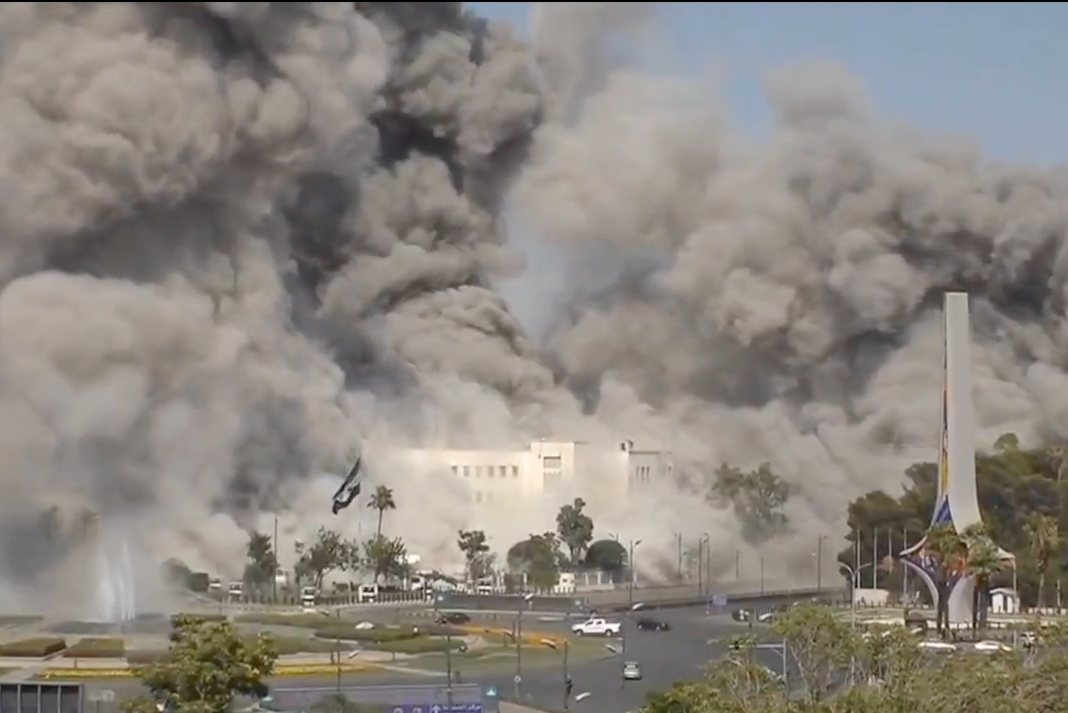Israeli Airstrikes on Damascus Escalate Tensions, Reshape Middle East Dynamics

Damascus, Syria – On July 16, 2025, Israel carried out a series of airstrikes in Damascus, specifically targeting the Syrian Ministry of Defense headquarters and areas close to the presidential palace. These attacks resulted in the deaths of at least three individuals and left 34 others injured. Israel characterized these strikes as a reaction to the sectarian violence occurring in southern Syria’s Sweida province, where clashes among Druze militias, Bedouin tribes, and Syrian government forces have led to over 260 fatalities since Sunday. This marks a notable escalation in Israel’s military engagement in Syria, raising global concerns and altering the regional geopolitical dynamics.
The Israeli Defense Forces (IDF) confirmed that they struck the entrance of the Syrian military headquarters and a site near the presidential palace, with the intention of pressuring Syrian forces to withdraw from Sweida. Israel claims its actions are aimed at protecting the Druze minority, whom it sees as a potential ally, amid accusations of Syrian troops executing Druze civilians.
Syrian state media reported significant damage to the Defense Ministry, with footage showing explosions and smoke rising from the area during live Al Jazeera broadcast. Although a ceasefire was declared later that day, its stability remains uncertain, given the history of failed truces, which has increased fears of further conflict.
Israeli Defense Minister Israel Katz issued a warning on X, stating, “The warnings in Damascus have ended – now painful blows will come,” indicating a firm military approach. The IDF has also bolstered its presence along the Syrian border, taking control of a UN-patrolled buffer zone near the Golan Heights, which Israel annexed in 1967.
The warnings in Damascus have ended – now painful blows will come. The IDF will continue to operate forcefully in Suwayda to destroy the forces that attacked the Druze until their complete withdrawal. Our Druze brothers in Israel, you can rely on the Israel Defense Forces to protect your brothers in Syria. Prime Minister Netanyahu and I, as Minister of Defense, have made a commitment – and we will uphold it – Israeli Defense Minister Israel Katz
The international community has expressed significant concern over the recent attacks. UN Secretary-General António Guterres criticized the strikes as “escalatory” and called for an immediate halt to violations of Syria’s sovereignty. Antonio Costa from the European Council echoed these sentiments, urging for de-escalation, while Norway’s foreign minister cautioned that Israel’s actions could jeopardize Syria’s delicate transition after Assad. The US, through Secretary of State Marco Rubio, also voiced its worries, emphasizing the importance of finding a resolution.
Meanwhile, Syria’s interim President Ahmed al-Sharaa firmly rejected any foreign interference, promising accountability for attacks on the Druze and asserting Syria’s readiness for conflict.
In the Middle East, reactions vary. Turkey, a significant regional player, condemned the strikes, reflecting a broader Arab opposition to Israeli actions. Conversely, some Druze leaders in Sweida dismissed Israel’s claims of protection, seeing them as a guise for expanding influence. Iran, a long-time ally of Syria, remains unpredictable, having conducted retaliatory strikes against Israel in June 2025, indicating its readiness to escalate if provoked. Saudi Arabia and Qatar, criticized by some on X for allegedly supporting Syria’s new Islamist-led government, have chosen to remain silent, possibly to avoid provoking Israel or the US.
The shifting global landscape is evident in Israel’s recent military actions in Damascus, which follow its operations in Beirut, Sanaa, and Tehran since October 2023. These moves highlight Israel’s capacity to exert influence in the region with a degree of freedom that raises alarms about a potential wider conflict. This is especially true as Israel deals with the new Islamist-led government in Syria, which took over from Bashar al-Assad in December 2024. Meanwhile, the United States is trying to improve relations with Syria’s interim government, but finds itself in a tricky position, as Israel’s military actions complicate these diplomatic efforts.
The Middle East is at a crossroads. Israel’s intervention in Syria, justified as protecting the Druze, is seen by some as a calculated effort to undermine the Syrian government and secure its northern border. This situation could potentially unify Arab nations against Israel, although existing rifts—like the differing stances of Qatar and Saudi Arabia regarding Syria’s new leadership—might hinder a united front. The ongoing Druze crisis in Sweida, which has resulted in over 250 fatalities, including 69 Druze fighters and 40 civilians, highlights the region’s instability, where local disputes can quickly escalate and involve outside powers.
Israel’s airstrikes on Damascus have plunged the Middle East into a new era of uncertainty. While these strikes aim to protect the Druze and limit Syrian military actions, they also risk turning a local conflict into a larger regional issue. The international community, particularly the UN and the US, is urging for de-escalation, but Israel’s bold stance and Syria’s stubborn response point to a challenging road ahead. As the Middle East observes closely, the results of this escalation will not only influence Syria’s future but also the delicate balance of power in the region.
The post Israeli Airstrikes on Damascus Escalate Tensions, Reshape Middle East Dynamics appeared first on Digpu News.
News